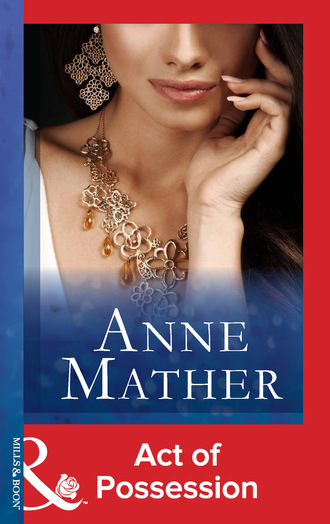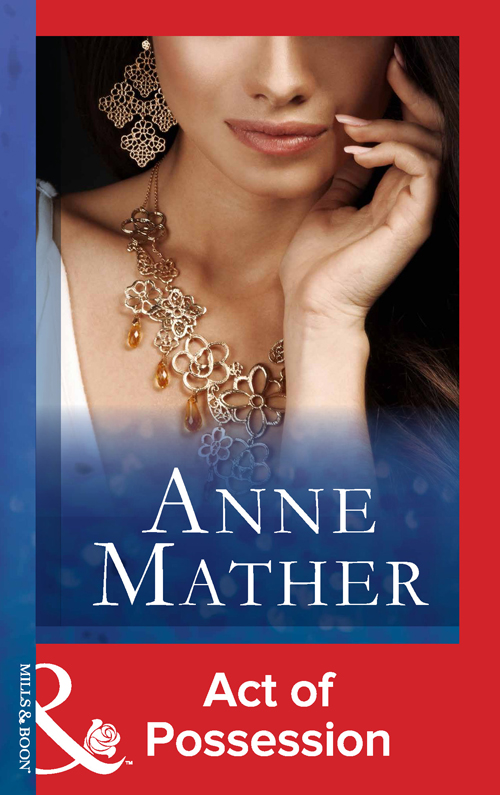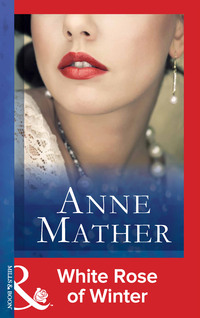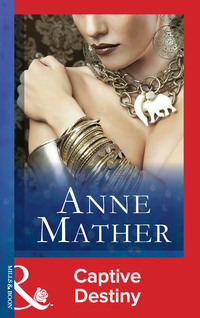
Полная версия
Act Of Possession


Mills & Boon is proud to present a fabulous collection of fantastic novels by bestselling, much loved author
ANNE MATHER
Anne has a stellar record of achievement within the
publishing industry, having written over one hundred
and sixty books, with worldwide sales of more than
forty-eight MILLION copies in multiple languages.
This amazing collection of classic stories offers a chance
for readers to recapture the pleasure Anne’s powerful,
passionate writing has given.
We are sure you will love them all!
I’ve always wanted to write—which is not to say I’ve always wanted to be a professional writer. On the contrary, for years I only wrote for my own pleasure and it wasn’t until my husband suggested sending one of my stories to a publisher that we put several publishers’ names into a hat and pulled one out. The rest, as they say, is history. And now, one hundred and sixty-two books later, I’m literally—excuse the pun—staggered by what’s happened.
I had written all through my infant and junior years and on into my teens, the stories changing from children’s adventures to torrid gypsy passions. My mother used to gather these manuscripts up from time to time, when my bedroom became too untidy, and dispose of them! In those days, I used not to finish any of the stories and Caroline, my first published novel, was the first I’d ever completed. I was newly married then and my daughter was just a baby, and it was quite a job juggling my household chores and scribbling away in exercise books every chance I got. Not very professional, as you can imagine, but that’s the way it was.
These days, I have a bit more time to devote to my work, but that first love of writing has never changed. I can’t imagine not having a current book on the typewriter—yes, it’s my husband who transcribes everything on to the computer. He’s my partner in both life and work and I depend on his good sense more than I care to admit.
We have two grown-up children, a son and a daughter, and two almost grown-up grandchildren, Abi and Ben. My e-mail address is mystic-am@msn.com and I’d be happy to hear from any of my wonderful readers.
Act of Possession
Anne Mather

MILLS & BOON
Before you start reading, why not sign up?
Thank you for downloading this Mills & Boon book. If you want to hear about exclusive discounts, special offers and competitions, sign up to our email newsletter today!
SIGN ME UP!
Or simply visit
signup.millsandboon.co.uk
Mills & Boon emails are completely free to receive and you can unsubscribe at any time via the link in any email we send you.
Table of Contents
Cover
About the Author
Title Page
CHAPTER ONE
CHAPTER TWO
CHAPTER THREE
CHAPTER FOUR
CHAPTER FIVE
CHAPTER SIX
CHAPTER SEVEN
CHAPTER EIGHT
CHAPTER NINE
CHAPTER TEN
CHAPTER ELEVEN
CHAPTER TWELVE
Copyright
CHAPTER ONE
‘DO come! It’s just going to be an informal affair,’ invited Celia warmly, her friendly smile brightening the rather gloomy hallway of the apartment building. ‘I’m sure it’s not much fun, living next door to someone who’s constantly giving parties!’ She grimaced. ‘That’s Liz’s fault really; but this time I’m to blame. It’s just a little celebration, you see, for a few friends. A kind of delayed birthday-cum-engagement party combined!’
Antonia’s eyes widened. ‘You’re engaged!’ she exclaimed, looking swiftly at Celia’s bare finger, and the other girl laughed.
‘I shall be after tomorrow evening,’ she confessed, with a contented sigh. ‘I’m going to marry Reed Gallagher. You may have seen his car outside. He drives a super black Lamborghini!’
‘Oh, yes.’ Antonia smiled. ‘I think I know the one you mean.’
‘How could you miss it?’ exclaimed Celia dramatically. ‘Well? Will you come? I wish you would.’
Antonia hesitated. Since moving into the ground floor apartment of the converted Victorian mansion six weeks ago, she had had little opportunity to get to know her neighbours. Her work at the institute kept her pretty much occupied, and besides, she had not come to London to enjoy a social life.
Nevertheless, she had not been able to ignore the occupants of the apartment above her own. They were the kind of people she had hitherto only read about in glossy magazines, their lifestyle totally different from her own. According to Mrs Francis—who was the caretaker’s wife and inclined to gossip—Celia Lytton-Smythe was the only daughter of the Conservative member of parliament for one of the south London constituencies, while her flatmate Liz, Elizabeth Ashford actually, was very well-connected.
Whatever the truth of it, and Antonia had no reason to doubt what Mrs Francis had said, they seemed nice girls. In fact, Antonia had only spoken to Celia, but she was not opposed to being friendly with both of them. Even so, she had no wish to get involved in a situation where she was obliged to return their hospitality. The salary she was getting at the institute was useful, but she did not fool herself that things were going to be easy. The rent for the apartment, for example, was still quite considerable, even if Uncle Harry had reduced the burden, and she wanted to be able to send some money home to her mother for Susie. Giving extravagant parties was simply beyond her means. Perhaps it would be more honest to admit that right away.
‘It’s very kind of you, Celia,’ she murmured now, shifting the carrier bag containing her week’s shopping from one hand to the other, ‘but I really don’t think—–’
‘Oh, don’t say no!’ Celia tilted her head disarmingly, the inverted bell of her hair swinging confidingly against her cheek. ‘I’m sure it can’t be much fun, sitting down here on your own every night.’ She dimpled ruefully. ‘Forgive me, if that sounds impertinent, but both Liz and I have noticed, you don’t get many visitors.’
Antonia coloured. She couldn’t help it. Even though she surmised she was at least five years older than the other girl, Celia’s remark had still had the power to strike a raw nerve. ‘No,’ she answered quietly. ‘No, I don’t. I’m afraid I must seem a very dull creature compared to your friends.’
‘Oh, don’t be silly!’ Celia touched her sleeve in protest, and Antonia guessed she had not intended to sound patronising. ‘But as you do go out so seldom, surely you’d enjoy a party, just for once! I mean, you wouldn’t have to stay long, if you didn’t want to. Just come and have a drink and wish Reed and me well.’
Antonia sighed. ‘Oh—–’
‘You’ll come?’ Celia took her indecision as a sign that she was weakening. ‘Of course, you will.’ Her warm smile appeared again. ‘Make it about eight-thirty, or thereabouts. There’ll be some food of sorts, if you’re hungry, and Daddy’s promised me at least a dozen bottles of champagne!’
Once inside her apartment, Antonia leaned back against the door with some misgivings. She should have been more decisive, she thought impatiently. She should have refused Celia’s invitation outright, instead of allowing the other girl to think she might change her mind. How could she go to their party? She didn’t know anyone; except Celia, of course. And besides, they were not her sort of people. Even Uncle Harry did not have Mercedes’ and Lamborghinis parked at his door.
Shaking her head, she pushed herself away from the panels and walked resolutely through the small living room and into the kitchen. Unpacking her shopping on to the drainer, she determinedly put all thoughts of the following evening’s activities out of her head. Concentrating instead on an examination of what she had bought, she quickly disposed of her groceries into the fitted cupboards, and then plugged in the kettle.
Pausing in the doorway to the living room, she surveyed her surroundings without emotion. When she had first seen the apartment, it had been unfurnished, and the rooms had seemed bigger then. Now, with her mother’s comfortable, chintz-covered sofa and armchairs taking up most of the space, there was hardly room for the gate-legged table she ate from. But then, her mother’s furniture had been bought to furnish a generously proportioned four-bedroomed semi, not a single person’s flat.
It was after six o’clock, she saw, with some surprise, the mellow rays of evening sunlight striking the face of the square carriage clock that stood on the mantelpiece. The apartments were centrally heated, but the old-fashioned fireplace still remained in Antonia’s living room, modernised now by the addition of a rather ugly electric fire.
However, it was not the incongruity of the heating system that concerned her now. She must have spent longer with Celia than she had thought. Her mother would have been expecting her to ring at six o’clock, as usual, and abandoning any thought of dinner for the moment, Antonia picked up the phone.
These bi-weekly calls to Newcastle were going to prove expensive, Antonia reflected now, as she dialled her mother’s number, but they were the only way she could keep in touch with Susie. Letters were not a satisfactory means of expression to an almost six-year-old, particularly one who found it hard to understand why her mother should have to go so far away to work. It simply wasn’t enough to say there were no suitable jobs in Newcastle. Susie wanted to know why, if her mother had to live in London, she couldn’t do so as well.
Mrs Lord answered the phone after the first couple of rings, and over her: ‘Hello, Antonia? Is that you?’ the protesting sound of Susie’s voice was clearly audible.
‘Yes, Mum, it’s me,’ Antonia answered ruefully, guessing her daughter was being quite a handful. ‘I’m sorry I’m late. I was talking to one of the girls who lives upstairs.’
‘You were? Susie, behave yourself! How nice, dear,’ her mother responded disjointedly. ‘But otherwise, you’re all right, are you? Have you had a good week?’
‘A busy one,’ conceded Antonia, sinking down onto the arm of the sofa close by. ‘Mr Fenwick has been away, and I’ve had to handle any emergencies myself.’
‘Really? Susie, put Tuppence down, there’s a good girl! They must have confidence in you then.’
‘Not necessarily.’ Antonia’s tone was dry. ‘But there is no one else, is there? Except Tom Brandon, of course, and he won’t do anything he’s not being paid for.’ She paused, and then added reluctantly: ‘I gather Susie’s playing up again.’
‘Oh, you know she has these phases,’ exclaimed Mrs Lord tolerantly. ‘Perhaps I’d better let her speak to you. There’ll be no peace for either of us until I do.’
Antonia felt the familiar constriction in her throat when she heard her daughter’s voice. She missed Susie terribly. Not just her company, and the mischief she got up to, but also her untidyness—the simple absence of anybody’s occupation of the apartment but her own. At home, she had seemed to spend her time clearing up after the child, and she remembered grumbling about doing so. Now, she would have welcomed the activity with open arms.
‘Are you being a good girl?’ she asked Susie now, after the initial greetings were over. ‘I can hear what’s going on, you know. While Nanna was talking to me, you were making a nuisance of yourself, weren’t you?’
‘No.’ Susie spoke with the convincing logic of someone who didn’t regret her actions.
‘But you were tormenting Tuppence, weren’t you? You know she doesn’t like being picked up.’
‘Tuppence is fat!’ declared Susie irrelevantly, as if the cat’s weight had anything to do with it. Then, her voice taking on a heartbreakingly tearful note, she added: ‘When are you coming to see me, Mummy? I don’t like staying here with Nanna. Nanna won’t play games with me like you do, and I don’t like watching television.’
‘Oh, Susie!’ Antonia pressed her lips together tightly, fighting back a similar kind of emotion. This was the first time she and her daughter had been parted. When Simon walked out, she had worried for a time that he might try and take the child away from her, but her fears had proved groundless. Now, she had done what she had always declared she would never do: leave Susie without either of her parents.
‘Couldn’t I come and stay with you?’ persisted the little girl now, taking her mother’s prolonged silence as an encouraging sign, and Antonia hated to have to disappoint her.
‘Darling, you have to go to school,’ she said, choosing her words with care. ‘And you have to take care of Nanna, too. She wouldn’t like to live in that big old house on her own.’
Susie sniffed mutinously. ‘Nanna wouldn’t mind …’
‘Yes, she would.’
‘… and I could go to school in London, couldn’t I?’ she added reasonably.
Antonia shook her head. ‘And what would you do when you came home from school and I wasn’t here?’ she asked gently. ‘Susie, you know if there was any way we could be together, we would be so.’ She hesitated. ‘You know I’ll be home for your birthday in two weeks time.’
Susie sniffed again. ‘Why can’t you come tonight? It’s Friday. You don’t work on Saturdays and Sundays, do you?’
‘Well … no …’
‘There you are then!’
‘… but it would be too expensive,’ explained Antonia, sighing. ‘Darling, the train fare to Newcastle costs too much for Mummy to come and see you every weekend.’
There was more of the same, and then when Susie finally dissolved into tears as she usually did, Mrs Lord came back on the line. ‘Don’t worry, Antonia,’ she assured her daughter airily, ‘five minutes after I’ve put down this receiver, Susie will have forgotten all about it. And Howard and Sylvia are coming tomorrow, so she’ll have the twins to play with.’
‘Yes.’ Antonia wished she felt more enthusiastic about that. Her brother’s twin boys were seven years old, and in her experience Susie had never looked forward to their advent. Still …
‘Don’t worry, Antonia,’ said her mother again, more brusquely now. ‘Look, my dear, I’ve got to go. Susie has to have her bath yet, and I haven’t fed Tuppence, and … and …’
‘And it’s Friday night,’ remarked Antonia, with controlled irony. ‘I know.’ Her mother usually played bridge on Friday evenings. ‘Okay, Mum. I’ll ring again on Monday as usual.’
With the receiver replaced on its rest, Antonia found her will to go and make herself something to eat had been sadly diminished. The kettle had switched itself off in her absence, and allowing herself to slide disconsolately off the arm of the sofa, she subsided on to the cushioned seat. She always had this awful sense of emptiness after speaking to her mother and Susie, and it was incredibly difficult not to give way to a totally selfish desire to burst into tears.
But self-pity was not something she allowed herself to indulge in for long, and presently Antonia got up from the couch and went to make a cup of tea. A pizza she had bought in the supermarket on her way home, was soon heated under the grill, and putting her cup and plate on a tray, she carried them back into the living room.
The portable black-and-white television her mother had insisted she brought from home to keep her company held no interest for her, and propping the paperback novel she was presently reading on the cushions beside her, she tried to become involved with its cardboard characters. But it was no use. Susie’s face kept intruding, and after eating half the pizza, Antonia put the book aside and turned on the radio.
The music programme she tuned into was soothing, and depositing the tray on the floor, Antonia curled her long legs up beside her. Had she really done the right thing by taking this job? she asked herself, for the umpteenth time, feeling the familiar sense of melancholy stealing over her. Was the fact that she had been looking for suitable employment for over three years a reasonable excuse for accepting a position so far from home? Uncle Harry, her mother’s brother, had certainly thought so; but then, he had done the same more than twenty years ago, so he was biased.
‘It’s not as if you’re a slip of a lass,’ he had remarked candidly, when he drove up to Newcastle to offer her this flat. He was referring to Antonia’s height of five feet eight inches, of course, and to the fact that she was five years past her twenty-first birthday. ‘And you have been married,’ he added, as if that was some further qualification. ‘Your mother won’t have to worry that you’ll get yourself into trouble, if you see what I mean.’
Antonia did see, and Uncle Harry’s words were valid. Her marriage to—and subsequent divorce from—Simon, had certainly taught her to be wary of the opposite sex. But as she had no intention of allowing any emotional relationship to develop, he could have saved his breath. Once bitten, twice shy, she quoted a little bitterly. She was free now, and self-supporting. No man was worth the sacrifice of surrendering those basic liberties.
Saturday was not one of Antonia’s favourite days of the week. It was the day she cleaned the flat for a start and, like Sunday, it was inclined to drag. Uncle Harry, who lived in Wimbledon, had suggested she should go to them on Sundays, for lunch, but Antonia did not think it was fair on Aunt Mary. Their own two sons, and their wives and families, often turned up for lunch on Sundays, and although that first lonely weekend in London Antonia had taken them up on their offer, she had felt an intruder. They had tried to make her feel at home, but they had their own lives, their own friends; people they could talk about, but who meant nothing to her. After several awkward interludes, when Antonia had been excluded from their conversation, an awkward silence had fallen, and Antonia had never repeated the experience.
Perhaps she was too sensitive, she thought wearily, as she was vacuuming her bedroom. Perhaps if she had gone every Sunday, she would eventually have fitted in to their lives. The trouble was, they had not known what to say to her, beyond asking about her mother and Susie. The subject of Simon was apparently taboo, and when she would have explained that she had long recovered from the effects of his rejection, Aunt Mary had steered the conversation into other channels.
Later that afternoon, as she sat in an armchair drinking a well-earned cup of tea, she became aware of the sound of furniture being shifted in the room above. Apparently, Celia and her friend were getting ready for the party, Antonia reflected, half-enviously. It was years since she had attended anything but family get-togethers. Her marriage to Simon had cut her off from all her college friends, and when they split up, it simply wasn’t possible to pick up the threads of her social life as if nothing had happened. Besides, there had been Susie to consider, and Antonia had tried to keep her life as stable as possible. But, after the divorce, the house she and Simon had bought with their savings had had to be sold, and Antonia had had no choice but to take her mother’s advice and go back to living with her.
Realising she was allowing herself to sink into a state of depression, Antonia got up from her chair and carried her cup into the kitchen. Then, flexing her aching shoulders, she walked into the tiny bathroom that adjoined her bedroom. Turning on the bath taps, she squeezed some scented bath gel into the water, and then turned back into the bedroom to find herself some clean underwear.
Ten minutes later she was soaking in the deliciously perfumed water, feeling the tensions she had been experiencing easing out of her. Even the uncertain weather beyond her windows, that sent raindrops pattering against the pane, no longer had the power to depress her, and she relaxed lazily, allowing her thoughts to drift.
Perhaps she should go to the party, she mused reflectively. After all, she had been invited, and she didn’t want to offend Celia. She was a nice girl, and she hoped she would be happy. No doubt this young man of hers—what was his name? Reed … Gallagher? No doubt, he was capable of supporting her in the manner to which she was accustomed. Celia would never be expected to do her own housework, or look after her own children, not unless she wanted to, of course. Antonia already knew that Mrs Francis paid a twice-weekly visit to the apartment upstairs: Just to give the place the once-over! as she put it; and whenever there was to be a party, the catering van from a very exclusive establishment was generally to be seen outside.
The water was cooling by the time she got out of the bath, and after drying herself vigorously to restore her circulation, Antonia slipped on the pink towelling bathrobe her mother had bought for her at Christmas. Her hair needed drying, and collecting the hand-drier from the cupboard, Antonia seated herself in front of the dressing-table mirror. Removing the towel she had wound around her head while she got dry, she surveyed her reflection wryly. At least, she had no problems about what to do with her hair, she thought, tugging a brush through the damp strands. Shoulder-length and straight, it defied any attempt she made to put curl into it; and although once she had gone so far as to try perming, the result had been so awful, she had never tried again.
Dry, the toffee-brown ends tipped silkily against her shoulders. Combed from a centre parting, the two shining swathes framed the oval contours of her face, a feathery fringe brushing eyebrows that were several shades darker. Examining her skin for any unsightly blemish, Antonia had to admit that the polluted air of London had done nothing to mar it. Hazel eyes, which could look green in some lights, looked back at her from between her lashes, their slightly elongated shape giving her face a mildly interesting look. She was not beautiful; she knew that. Although she had good bone structure, her mouth was too wide, the lower lip too full. In the early days of their relationship, Simon used to say she had a sexy face, but she had long since dismissed any claims he made. Simon had wanted to get her into bed, and he had succeeded. The result had been Susie, and the rest was history.
Abandoning this particular train of thought, Antonia got up from the mirror and expelled her breath heavily. What was she going to do? she asked herself. Go to the party; or consign herself to another night of self-recrimination? She was becoming far too morose and introspective, she thought; and dull, painfully dull! Just because she had had one bad experience, she was allowing its aftermath to colour her whole outlook on life. All right, so she didn’t want to get involved ever again. She didn’t have to. She could still enjoy a party, with no strings attached.
The problem of what she was going to wear if she did go loomed next on her horizon. What did one wear to an informal party of this kind? She could wear jeans, she supposed, or cotton trousers; but as she wasn’t absolutely sure how informal informal was, she decided it would be safer to stick with a skirt.
The fitted wardrobe easily accommodated her clothes with room to spare. One advantage of not leading a hectic social life was that one had less reason to buy expensive outfits, and Antonia’s needs were not extensive. She generally wore a suit or a tailored dress to the office, and casual wear at other times. In consequence, what choice she had was limited, and she doubted there was anything to completely suit her purpose.









